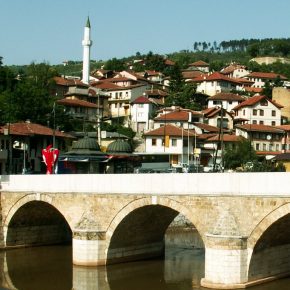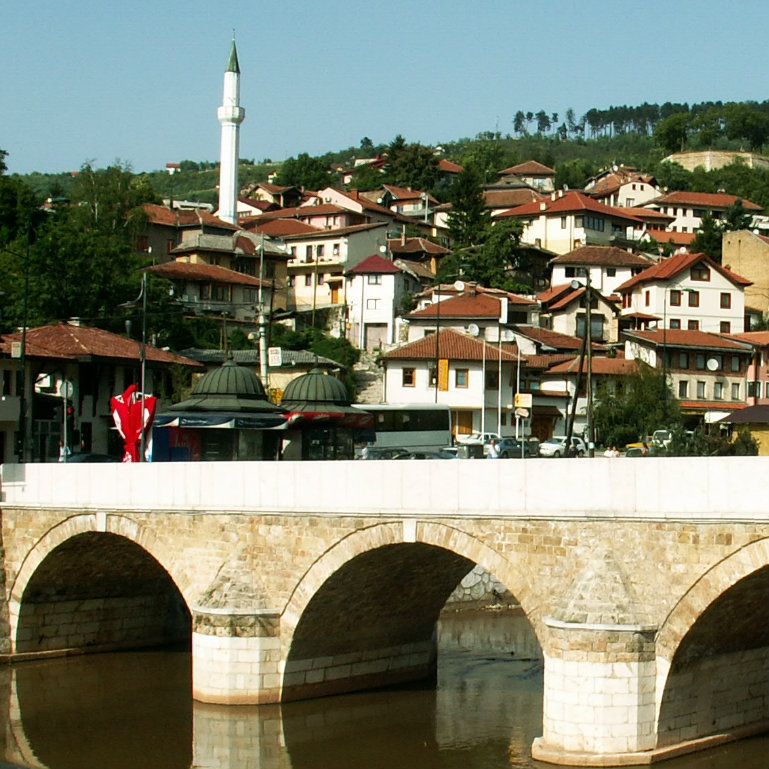
Sarajevo, Bosnia and Hercegovina (jaime.silva, CC BY-NC-ND)
Ethnicity is a concept that determines not only politics and policies of Bosnia and Herzegovina (BiH) but also its socio-economic conditions. After all it has been thoroughly divided along ethnic lines, between the three constituent peoples – Bosniacks, Serbs and Croats. Or, to be more precise between political elites claiming representation of the interest of the respective peoples.
Bosnia and Herzegovina is divided into two autonomous “entities” (the term “state” as one of the united states or a bundesstat has been consciously rejected by brokers of the Dayton Peace Agreement that created modern Bosnian state in 1995). Dominated by Serbs – Republika Srpska (RS) and inhabited by Croats and Bosniaks – Federation of Bosnia and Herzegovina (FBiH). While RS remain relatively unitary entity, the FBiH is further federalized into ten cantons. Three of them are controlled by Croats, two remain of mixed – Croat-Bosniac character and another five are dominated by Bosniacs themselves. Small minorities are visible in each part of the country. To complicate even more the Bosnian question – District Brčko has been established out of two municipalities in a strategically important North-East corner of Bosnia. District remains under the international control.
The ethno-territorial division of the country reflects very misbalanced division of competences. Empowered entities and cantons overshadow the weak state and even weaker municipalities. The state’s competences are very much limited. On top of that all the state institutions are subject to ethnic parity. Even the central state institutions remain under the pressure of competing ethno-fractions. In other words, already formally weak state is further weakened by the fractions between elites representing various ethnic groups. Most of the responsibility for economy, agriculture, security social welfare, insurance system, banking, housing, infrastructure, etc. falls on Entities and Cantons.
Economic outlook
The situation in Bosnia and Herzegovina is far from good. GDP per capita (2015) is as low as EUR3,728. Although domestic product is growing the 3.2 per cent growth rate is not impressive. Previous years were even worse with -0.9 per cent rate in 2012 and only 1.1 increase in 2014. Very negative trade balance with export covering hardly 50 per cent of country imports and reflects only third part of the pre-war exports. Yet, according to the World Bank, exports remain main driver of the growth. The structure of the trade (main export products are: seats, leather footwear, raw aluminum, vehicle parts and sawn wood) proofs again the very peripheral character of the BiH economy. Visit in any local shop confirms this. In this agricultural country the shop shelves are filled with food products from Croatia, Serbia, Slovenia, Hungary and Turkey. Import products are: refined petroleum, crude petroleum, cars, packaged medicaments and coal briquettes. The Global Innovation Index puts BiH on a very low 87th position (out of 128). For comparison – Poland is 39th. With such state of the economy even relatively high, 48th position in Economic Complexity Index does not bring much comfort.
According to the Global Competitiveness Index, BiH is 111th out of 140 examined economies. Bosnia is also 76th most corrupted country in the world which makes it regional average but pretty high in comparison with other European states.
The poor state of economy is obviously reflected in the society. Official unemployment rate exceeds 27 per cent but unofficial number is much higher. When one takes into account relatively low average wages (EUR177) and fact that according to the Gini Coefficient Bosnia and Herzegovina is one of the most unequal countries in Europe when it comes to income, the picture is even less colorful. Moreover, average net wage is lower than minimum net wage (EUR181) A careful observer of social conditions will see the increasing number of small gardens where families grow their own food. It is obviously healthy and ecological activity very popular in Scandinavia and the Western Europe. The rationale behind it, however, is far from the Scandinavian model.
Instead of benefiting from the blessing of decentralization and ability to decide on the economic development, BiH elites preserve the country in the stage of permanent crisis, high unemployment, dysfunctional public services and so on.
Foreign investors are not eager to come to BiH
The strategic location of the country is nullified by bad infrastructure, high corruption, unclear administrative rules, irresponsible political elites and small and poor market. According to the Santander Trade Portal “the sectors that attract the most foreign investment are the manufacturing, banking and telecommunications, although a significant portion of FDI is invested in trade, financial services and other services sectors.” Bosnia and Herzegovina looks bad to investors comparing to Eastern European or Central Asian markets when one compares ability of shareholders to take legal action and the general level of investors protection. The main advantages for potential investors are cheap labor, high unemployment and stable currency, directly linked to Euro.
The reason behind such situation lies in political and institutional system that not only preserves ethnic division but also encourage it and deepen the cleavages. Cooperation does not bring political benefits. The markets are divided, administration overgrown and legal regulations unclear.
Constant accusation of hampering socio-economic development
Mainstream discourse goes as follows: (i) “RS faces problems because of the dysfunctional central authorities and the Bosniac pressure to upheld and even further strengthen them”; (ii) “Bosniacs cannot face the crisis and the relevant problems because the Serbs are blocking any centralization efforts; (iii) “Croats see their own (third) entity as the answer to their problems, which cannot be granted because Bosniacs push for centralization”. Mantra of protection “interest of our constituent people” circulate in the air and does not want to die.
Why not break this circle by elections? The public institutions are the largest employer in the country (roughly 40 per cent of the total employment) and pay pretty well. Employees are thus bonded to the ruling elites. Secondly, Dayton Peace Agreement cemented the post-war political reality. Citizens are voting against those who “attacked them in 1992” and for those who “protected them between 1992-1995”. Despite the fact that the war has not been won by any of the sides. The same people who led to the war in 1990s, then who managed the warring parties during the war, won the first elections and remain dominant power ever since.
One of the anticipated ways to break this deadlock is to stop the inflow of international donations responsible for almost 40 per cent of the budget. This funds go to public institutions and provide 40 per cent of employment in Bosnia with salaries and pension schemes, thus provide relative stability to corrupted elites. The Bosnian problem is so complex, and Bosnian elites so deeply rooted in the state and economy that international community is virtually buying peace by opening new internationally sanctioned loans. All efforts to force each side to put down their weapons in this political conflict were quickly abandoned. In September, the IMF decided to grant another loan to Bosnia and Herzegovina of EUR553.5m divided into 12 instalments across 3 years period.
What can be changed in the nearest future? The central government claims adoption of reforms would enable more efficient functioning of public institutions paving the way for faster economic growth. This was the condition of the IMF funding. The hopes are high but it is not the first time that the Bosnian leaders agreed on key reforms, of which very little or none has been implemented.


